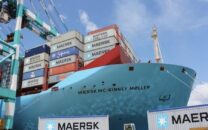
Maersk increases surcharges from June 2024
On this page “Maersk increases surcharges from June” gives information on international freight carrier announces rate hike from June, as prolonged Red Sea trade route disruptions now expected to persist into third quarter of 2024.
The company discloses this in a customer advisory to its clients updating them on the situation in the Red Sea and what to expect in the coming months of June.
In addition, the statement explains the lingering security issues in the Red Sea creating additional costs for the company in terms of fuel and additional charter rates due to the long distance.
Furthermore, the company noted that it has increased sailing speed, leased additional 125,000 containers, and organized its fleet to enhance capacity as part of efforts to deal with the present challenges.
statement how Maersk increases surcharges from June
As we shared in a 6 Month updates, over the complexity of the situation in Red Sea and the ripple effects on global supply chains in recent months, and this has caused industry-wide disruptions.
To help with the additional costs, some surcharges will increase temporarily. It is believe that relevant surcharges shall appear in customers new invoice higher than previous months. Note that we will continue to review the surcharges regularly and keep you updated on changes. In addition, You can find the latest information on surcharge site – Maersk.com.”
In the month of October 2023, Houthi Rebels in Yemen in solidarity with Palestinians against Israel’s invasion of Gaza began attacking merchant vessels sailing through the Red Sea. The continuous launching of missiles across the vital global trade route pushed shipping companies like Maersk, AP Hapag-Lloyd, and MSC to divert their vessels towards the longer route through the Cape of Good Hope in South Africa.
- Ships are now taking an alternative route around the Cape of Good Hope in South Africa, which adds 10 to 14 days to their travel. This long journey resulted in higher fuel costs.
- The Red Sea is a crucial global trade route, facilitating approximately 12% of global shipping traffic and connecting Europe, the Middle East, and parts of Africa.
Basics views to note
- A report by Afrexim Bank on the impact of the disruption of global trade in the Red Sea on macroeconomy stability in Africa stated that it could lead to higher inflation levels and more hawkish monetary policy stance among Central Banks in the continent.
- According to the report, the increased freight costs will not only affect the prices of consumer goods across the continent but will also exacerbate the already high inflation levels.







